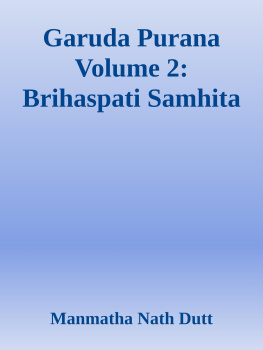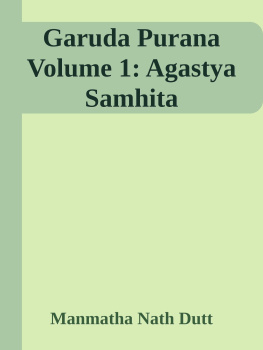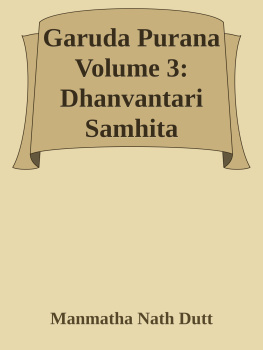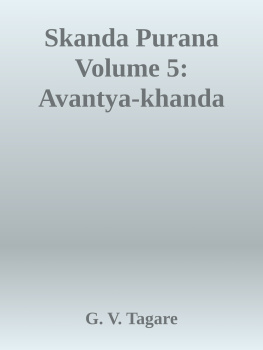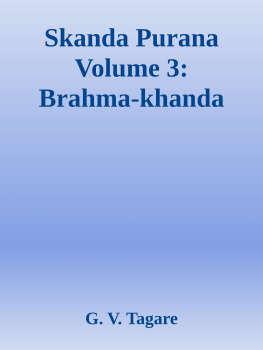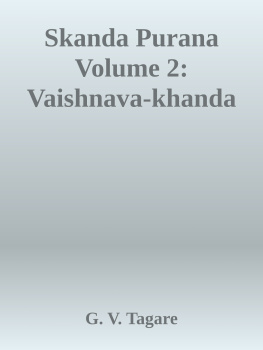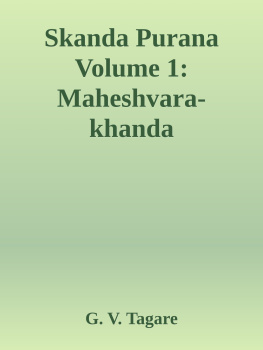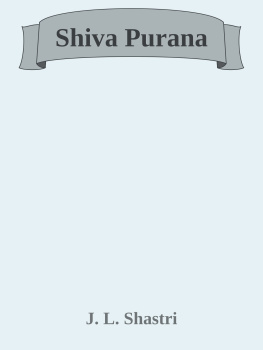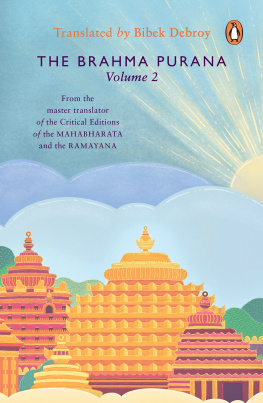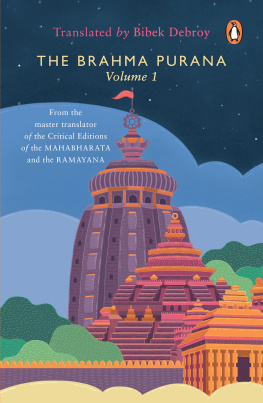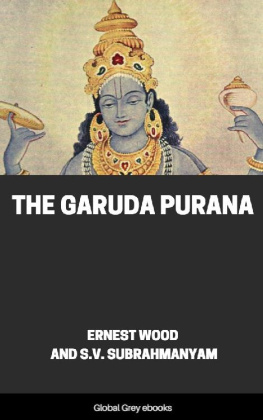Manmatha Nath Dutt - Garuda Purana Volume 2: Brihaspati Samhita
Here you can read online Manmatha Nath Dutt - Garuda Purana Volume 2: Brihaspati Samhita full text of the book (entire story) in english for free. Download pdf and epub, get meaning, cover and reviews about this ebook. genre: Religion. Description of the work, (preface) as well as reviews are available. Best literature library LitArk.com created for fans of good reading and offers a wide selection of genres:
Romance novel
Science fiction
Adventure
Detective
Science
History
Home and family
Prose
Art
Politics
Computer
Non-fiction
Religion
Business
Children
Humor
Choose a favorite category and find really read worthwhile books. Enjoy immersion in the world of imagination, feel the emotions of the characters or learn something new for yourself, make an fascinating discovery.
- Book:Garuda Purana Volume 2: Brihaspati Samhita
- Author:
- Genre:
- Rating:5 / 5
- Favourites:Add to favourites
- Your mark:
- 100
- 1
- 2
- 3
- 4
- 5
Garuda Purana Volume 2: Brihaspati Samhita: summary, description and annotation
We offer to read an annotation, description, summary or preface (depends on what the author of the book "Garuda Purana Volume 2: Brihaspati Samhita" wrote himself). If you haven't found the necessary information about the book — write in the comments, we will try to find it.
Garuda Purana Volume 2: Brihaspati Samhita — read online for free the complete book (whole text) full work
Below is the text of the book, divided by pages. System saving the place of the last page read, allows you to conveniently read the book "Garuda Purana Volume 2: Brihaspati Samhita" online for free, without having to search again every time where you left off. Put a bookmark, and you can go to the page where you finished reading at any time.
Font size:
Interval:
Bookmark:
) said:Now I shall discourse on the Science of Ethics and Expediency, a perusal whereof may benefit kings and commons alike, and enable them to secure Jong lives, and good names on earth, and exalted stations in heaven after death. A man wishing success in life, shall make it a point not to mix in vulgar companies, but to associate only with the best and the most virtuous in the land. Company of the wicked or of the inequitous is neither good in this life nor in the one to come. A man should shun even any oral discourse with the wicked, avoid their presence and company, be on his guard against picking up a quarrel with his trusted friends, or against mixing with those who serve his enemies or are in friendly terms with them.
Even a learned man comes to grief by teaching a bad pupil, or by maintaining a bad wife. An evil company is but should be shunned from a distance. One should make a compact with ones enemies, or a breach with his friends at the right moment. Wise men bide their time out of motives of expediency and with a full, regard to the cause and effect of their each act of conduct. It is Time that rears up all created beings. It is Time that brings about their dissolution. It is Time which sits up fully awake when all else is asleep. Hence Time is unconquerable, and suffers no slightness of his authority. It is Time that makes the semen flow in to its natural repository, and evolve itself in the shape of a ftus in the womb. Time is the principal factor in the evolution of the universe, and it is. Time that will bring about its final dissolution. Invisible is the fight of time, which becomes manifest at one place by the occurrence of gross phenomena, while in another it is too subtile to be detected.
The following synopsis of the rules of conduct was narrated by Vrihaspati to is a father to him. He in whom confidence is reposed is a friend and the country which provides ones means of livelihood is ones true country. A servant who does the commands of his master, is a true servant, a seed which sprouts is a true seed; a child that lives is a true child, and a wife who speaks sweet is a true wife. He who has virtue is truly alive. He who has piety lives but in the true sense of the term. Futile is the life of him who is bereft of piety and commendable attributes. She who speaks sweetly to her husband and is a clever manager of household affairs, is a true wife. She who is one in spirit with her lord and devotes her whole self to his happiness, is a true wife. He whose wife decorates her person with sandal paste and perfumes her body after her daily ablution, talks little and agreeably, partakes small quantites of food, is ever fond of him and is constantly engaged in doing acts of piety and virtue with a view to bring happiness and prosperity in the house, and is ever ready to yield to the procreative desires of her lord, is not a man, but the lord of heaven.
A scolding wife, wild, querulous and argumentative, is but the blight of life (lit.:old age itself). A wife, attached to another and fond of staying in an other mans house, and who is not ashamed of her own depravity, is but the curse of life. A wife who appreciates and honours the good qualities in her lord and lives in loving submission to his wishes, is satisfied with the little she gets, is alone entitled to be called a beloved. An unchaste wife, an insincere friend, an argumentative servant, and a residence in a snake-infested chamber, are but the preludes to death. Walk not in the path of the wicked, but sit in the assembly of the pious and the godly. Suffer not the transitory character of all mundane things to be absent for a moment from your mind, and be perpetually engaged in doing what is good and commendable. A woman who is deadlier than the fangs of a serpent, or one that is blood-eyed, black and fierce as a tigress, or is possessed of a cow-like tongue and becomes foul-mouthed in rage, or is eccentric in her habits, apathetic and fond of staying in an othermans house, should not be courted by a wise man for matrimonial alliance He who lives in a snake-infested chamber, or whose disease has run into an incurable type, as well as the one who has passed through the three bodily stages of infancy, youth and old age, is undoubtedly in the grasp of Death. Where is the man who can retain his mental equilibrium under the circumstance?
inhabitants walk in the path of inequity, give up his residence in a house found to be infested with dangers, avoid all connections with a niggardly prince, and forego the company of deceitful friends. Of what good is the gold which is in the greedy gripe of a miser? Of what worth is the knowledge which is wedded to a low cunning nature? What does mere personal beauty avail a person whose mind is not adorned with ennobling attributes? And what is the good of ones having a friend who forsakes one in days of adversity.
From unforeseen quarters friends gather round a man in power and prosperity. Even the very kins of one, out of office and fortune, turn their back as enemies in ones adversity. Friendship is tested in distress; valour, in battle; a wife, on the loss of fortune; and an agreeable guest in time of famine or scarcity. Birds forsake a tree whose fruits are gone. Herons visit not the shores of a dried pool. Courtesans smile not on (forswear the company of) a person whose purse is exhausted, nor Ministers flock round a king, bereft of his sovereignity. On the withered flowers the bees sit not with their melodious hummings, nor do herds of deer roam about in the forest which a wood fire has consumed. One person endears another simply out of motives of self-seeking. Is there any love for loves sake an earth?
The greedy are taken by gain, the proud by a show of humility, fools, by pleasing themes, and the wise by truth. The gods, the good and the likes and dislikes, and thus speedily win them over to his cause or side.
No confidence should be reposed in (the freaks of) rivers, horned cattle, clawed beasts, women, persons of royal blood and arm-bearing individuals (fully equipped soldiers etc.,) A prudent man should never give any publicity to any insult he might have suffered, to any deception that might have been practised upon him, to any heart-ache of his own, nor to an instance of female infidelity in his house. Movements in a low or wicked company, a long separation from her husband, excessive and indulgent fondling, and a residence in anothers house are the factors which excite a wife to break her plighted faith. Who is he who can boast of a spotless pedigree? Where is the man who has never been assailed by any malady? Who is he whom danger doth not beset in life? Who can be sure of the perpetual favours of fickle fate? Who is he whom opulence filleth not with pride? Who is he, who standeth above all probability of danger? Where is the man who is impervious to female charms? Who is he whom a king doth love in his heart? Who is he whom Time doth not sway? Who is he whom begging doth not lower? Who is he who being netted with the guiles of the crafty, has come off unscathed? Perpetually in distress is the man who has no friends or relations of his own, nor endowed with a sharp intellectual faculty and incapable of putting a success to better advantage. Wherefore should a wise man engage in a pursuit, success in which does not bring in any profit, and failure whereof is fraught with dangerous results. Quit the country where you can find neither friends nor pleasures, nor in which is there any knowledge to be gained.
Acquire that wealth which kings or thieves can neither extort nor steal and which follows a person even beyond the grave. Your successors, after your demise, shall inherit and divide among themselves the wealth which has cost you lifelong and killing toils to acquire.
Font size:
Interval:
Bookmark:
Similar books «Garuda Purana Volume 2: Brihaspati Samhita»
Look at similar books to Garuda Purana Volume 2: Brihaspati Samhita. We have selected literature similar in name and meaning in the hope of providing readers with more options to find new, interesting, not yet read works.
Discussion, reviews of the book Garuda Purana Volume 2: Brihaspati Samhita and just readers' own opinions. Leave your comments, write what you think about the work, its meaning or the main characters. Specify what exactly you liked and what you didn't like, and why you think so.

